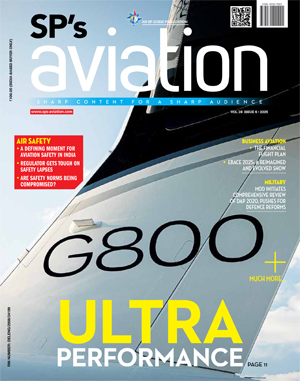INDIAN ARMED FORCES CHIEFS ON OUR RELENTLESS AND FOCUSED PUBLISHING EFFORTS

The insightful articles, inspiring narrations and analytical perspectives presented by the Editorial Team, establish an alluring connect with the reader. My compliments and best wishes to SP Guide Publications.

"Over the past 60 years, the growth of SP Guide Publications has mirrored the rising stature of Indian Navy. Its well-researched and informative magazines on Defence and Aerospace sector have served to shape an educated opinion of our military personnel, policy makers and the public alike. I wish SP's Publication team continued success, fair winds and following seas in all future endeavour!"

Since, its inception in 1964, SP Guide Publications has consistently demonstrated commitment to high-quality journalism in the aerospace and defence sectors, earning a well-deserved reputation as Asia's largest media house in this domain. I wish SP Guide Publications continued success in its pursuit of excellence.
- The layered Air Defence systems that worked superbly, the key element of Operation Sindoor
- Operation Sindoor | Day 2 DGMOs Briefing
- Operation Sindoor: Resolute yet Restrained
- India's Operation Sindoor Sends a Clear Message to Terror and the World – ‘ZERO TOLERANCE’
- Japan and India set forth a defence cooperation consultancy framework, talks on tank and jet engines
Do Away

It is clear that the Indian taxpayer can no longer afford Air India. But do we have a Lee Kuan Yew in the political leadership to rid the nation of the massive millstone around its neck?
In the early 1980s, pilots of Singapore Airlines, then rated as the number one international carrier in the world, decided to embark not on a strike but on a “go slow” campaign, a silent protest against the policies of the airlines; as such activities were unheard of in the tiny but prosperous island nation. The Prime Minister of Singapore, Lee Kuan Yew, summoned the management of the airlines along with concerned functionaries of the government, disbanded the union and asked all present there to restore the airline to its glorious international status within 30 days; failing which he would have no hesitation in ordering the closure of the airline. In his view, if Singapore did not have an airline that was the best in the world, it did not deserve to have one.
Compare this with Air India and the approach of the management as well as that of the Indian Government towards handling the airline. Air India pre or post merger, has always been run as a department of the Central Government and is afflicted with all the associated ills. It does not have viable business model structured on sound financial principles, is overstaffed, has low productivity, inhabited by mediocrity, does not have even the least bit of accountability and has not had the benefit of professional management in the last two decades. During this period, it has been riddled with labour dispute, has been totally mismanaged by the bureaucracy at the helm of affairs and has suffered due to political interference and subversion. Anyone and everyone associated with the management or in position of authority have exploited the airline shamelessly. Its operations have never been genuinely profitable and the airline has been remaining afloat not on its own strengths but on periodic and generous infusion of funds, the latest of which is a humongous dole of Rs. 30,000 crore out of the taxpayer’s money.
Much of the responsibility for the malaise within the airlines must lie on the government. Some of the strategic decisions have been taken allegedly to benefit people in power or private carriers. These have included withdrawal from profitable routes that were handed over to the leading airlines in the private sector and the placing orders for 111 new aircraft which the financial position of the airline clearly could not support. Usually, large orders for airliners are accompanied by hefty commission and so it must be in this case as well. Perhaps it ought to be a subject of probe as has been the trend in the recent past on other alleged mega scams. But the last nail in the coffin has undoubtedly been the rather thoughtless decision to merge the international carrier Air India and the domestic carrier Indian, the erstwhile Indian Airlines. Despite the huge funds expended, the exercise has been a complete failure.
Last year, the Indian Commercial Pilots Association (ICPA), the faction consisting of pilots of erstwhile Indian, had gone on a strike on account of a dispute over non-payment of salaries for several months. Consequently, the airlines lost hundreds of crores of rupees and the travelling public held to ransom. This year, the 550-member Indian Pilots Guild (IPG) comprising pilots of pre-merger Air India went on an undeclared strike from May 8, 2012, throwing most international and some domestic operations of the airline out of gear as pilots reported sick en masse. Apparently, the IPG has resorted to an unofficial strike in response to the decision by the management to include pilots of the premerger domestic carrier for conversion on to the Boeing 787 Dreamliner; as in their view, it would seriously impinge on their career progression. While the strike last year may have drawn a modicum of public sympathy, the strike beginning May 8, in which the public sector undertaking has lost hundreds of crores of rupees and international operations in complete shambles aggravating further the irredeemable financial mess the airline is in.
At the time of writing, the strike has entered the fourth week with no end in sight to the stalemate. It is clear that the Indian taxpayer can no longer afford Air India. But do we have a Lee Kuan Yew in the political leadership to rid the nation of the massive millstone around its neck?





